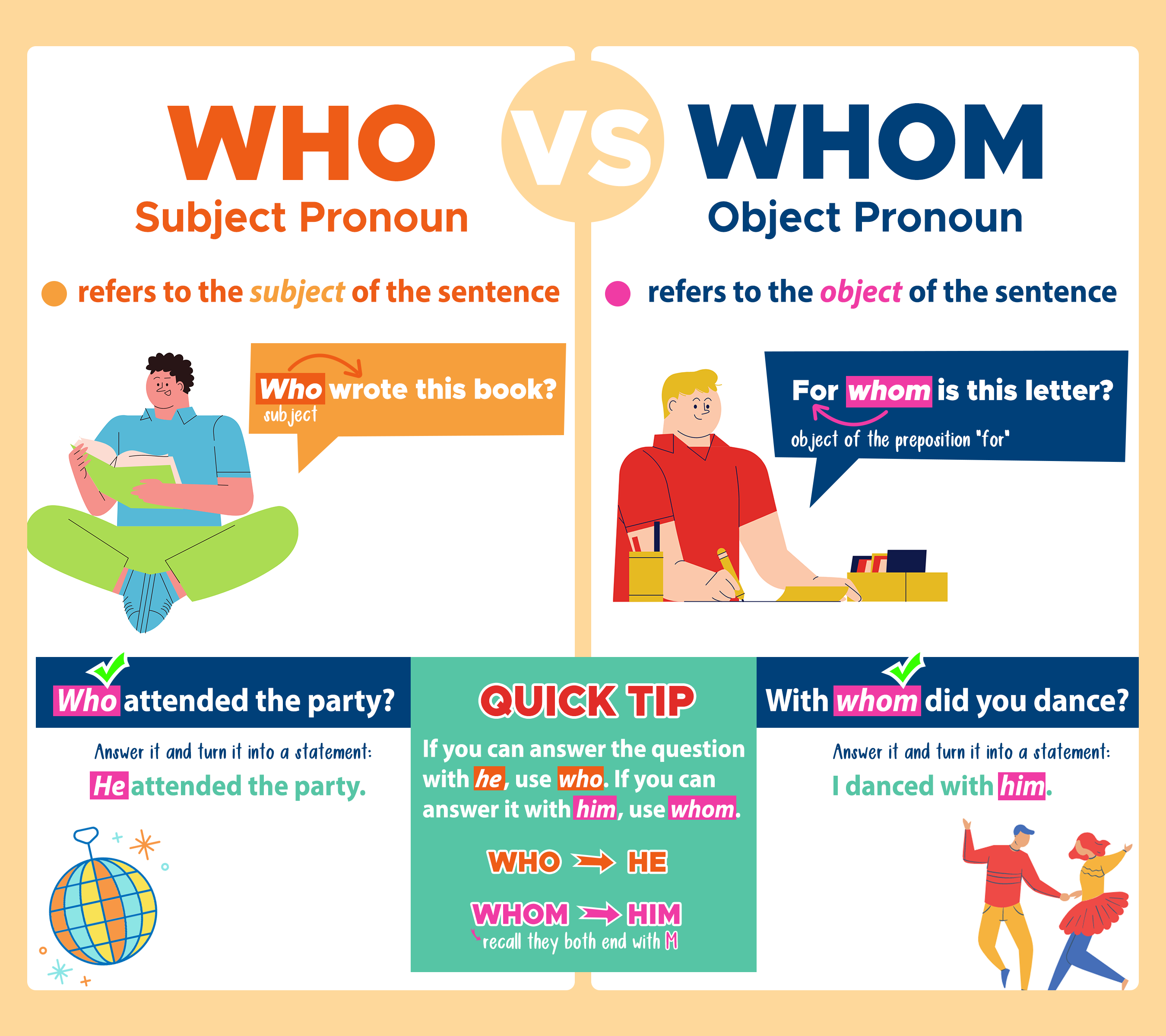Understanding the difference between who vs whom can be confusing. Both words are pronouns, but they serve different functions in a sentence. Who is used as a subject: “Who ate all the cake?” On the flip side, whom serves as an object of a verb or preposition: “To whom did you give the letter?” Here are more examples:
- Who opened the windows? [Who is the subject or doer of the action]
- She’s the teacher who flunked the whole class. [Who identifies the subject she]
- Whom did you see? [Whom is the object of the verb see]
- For whom are these gifts? [Whom is the object of the proposition for]
Trick to Remember the Difference Between Who vs Whom
Choosing between who and whom is a real head-scratcher. However, if you do this simple trick, it’ll be much easier to make the right choice:
If you can replace the personal pronoun with he/she, use who. If him/her works better, use whom. For easier recall, associate whom with him because they share the same last letter (i.e. m).
For example:
- Who/whom was here yesterday?
Test whom by substituting it with him/her: Him was here yesterday? Next, try who using he/she: He was here yesterday? The second sentence adds up; thus, the right word is who:
Who was here yesterday?
Here’s another example:
- Who/whom was he with when you saw him?
Rearrange the sentence to create a simple comparison: He was with him (whom). He was with she (who). The first sentence sounds better and is grammatically correct, so use whom:
Whom was he with when you saw him?

Related Reading: Pronouns – Substitution Over Repetition
Who vs Whom in Subordinate Clauses
Who and whom are relative pronouns that relate or add details to a word in a sentence. They do that by introducing subordinate clauses. The other relative pronouns are that, whose, which, where, and when.
For example, here are sentences with who/whom subordinate clauses (italicized):
- Jane was the only student who passed the exam. [Who relates to the subject Jane]
- Don’t marry a guy whom you just met. [Whom relates to guy, the object of the verb marry]
When you can’t decide which to use in a subordinate clause, apply the substitution trick. In the sentence, “Jane was the only student who passed the exam,” who is correct because rewording the subordinate clause and replacing it with she makes perfect sense: “She (who) passed the exam.”
The second example is a bit trickier, but looking closely at the subordinate clause leads us to the right track. “Whom you just met” can be altered into “you just met him (whom).” It would be weird to say “you just met he,” so go with whom.
More examples:
- Jane Austen was an English novelist who wrote Pride and Prejudice. [Who adds more details to the novelist/subject Jane]
- It’s heartbreaking to lose a friend whom I’ve known for decades. [Whom refers to friend, the object of the verb lose. Reword to confirm: I’ve known him (whom) for decades.]
- The leader whom we trusted is gone. [Whom refers to the object of the verb trusted. Alter the subordinate clause to check: We trusted him (whom). Therefore, whom is correct.]
NOTE: If the sentence can stand without who and whom, you may remove them. Notice how the last example above gets by without whom: The leader we trusted is gone. However, in sentences like the first example, who is essential to the clause. Cutting it out would leave us with a non-sentence, “Jane Austen was an English novelist wrote Pride and Prejudice.”
Whoever vs Whomever
Like who, whoever is a subject pronoun. And like whom, whomever is an object pronoun. Whoever can replace the subjective pronouns who, she, he, they, and we, while whomever can stand for objective pronouns whom, him, her, and them. When in doubt, apply the same trick we use for who/whom. Here are examples of sentences with whoever and whomever:
- Whoever arrives late will be penalized. [Whoever is the subject. Replacing it with he gives us a clear sentence: He arrives late.]
- Tracy befriends whomever she finds trustworthy. [Whomever is the object of the verb befriends. Apply the trick to confirm: Tracy befriends him (whomever) vs. Tracy befriends he (whoever). Whomever is correct.]
Perfecting the use of whoever and whomever requires practice and conscious effort. And if you still get stuck in between, rephrasing saves the day. Change the pronoun into something more definite or reword the sentence to eliminate the need for whoever/whomever.
- Tracy befriends people whom she finds trustworthy.
- The person who arrives late will be penalized.
Practice.
Fill in the blanks with the correct pronoun in the parentheses.
- _____ (Who, Whom) initiated the fight? And from _____ (who, whom) did you hear about it?
- _____ (Whomever, Whoever) fell for the scam wasn’t thinking clearly.
- We didn’t know _____ (whom, who) called last night.
- They only accommodated those _____ (whoever, whom) they considered well-off.
- She can’t stop talking about _____ (whomever, whoever) she meets on the app.
Answers.
- Who initiated the fight? And from whom did you hear about it?
- Whoever fell for the scam wasn’t thinking clearly.
- We didn’t know who called last night.
- They only accommodated those whom they considered well-off.
- She can’t stop talking about whomever she meets online.
Thank you for reading. We hope it’s effective! Always feel free to revisit this page if you ever have any questions about who vs whom.

